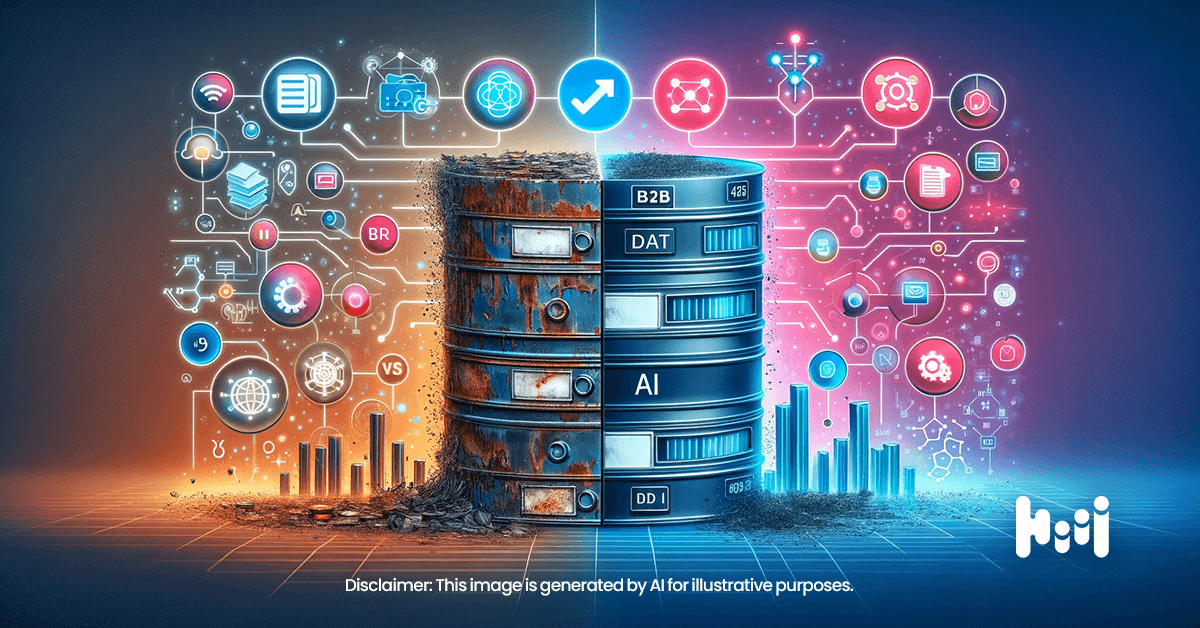
Leveraging buyer intent data has always been a boon for marketing and sales teams. Who wouldn’t want to nurture and work with customers that show the greatest likelihood to buy what you’re selling?
The weakest link when it comes to applying buyer intent for practical use has always been the people interpreting what the data means. But what happens when you apply the significantly boosted computational power of artificial intelligence (AI) to your buyer intent data? Let’s explore various use cases and uncover why this is a potential game-changer.
Of AI, Algorithms, and Machine Learning
It was Alan Turing who kicked off the study and development of AI when he asked: “Can machines think?” Today, we’re enjoying the fruits of that one question. Every time you call on Siri, Google, or Alexa, you’re engaging modern AI.
So, what is AI? Jeremy Achin, addressing a crowd in Japan, defined AI as: “a computer system able to perform tasks that ordinarily require human intelligence.”
Like human intelligence, AI needs to be taught to do what you want it to do. That’s where algorithms come in. While simplistic, you can think of algorithms as instructions used to teach AI what to do. Early iterations of AI had closed-ended algorithms where there was a clear start and end to what you allowed AI to do. Today, we’re starting to see algorithms that open enough to allow AI to learn on their own—often leading to AI discovering more efficient ways of doing things.
This is machine learning (ML) and is the reason why AI is seeing more widespread applications in business processes. , ML allows AI to process buyer intent data quickly and with far more efficiency than any human. You might initially teach it to look for key data points that matter to you, but—depending on how powerful your AI is—it can spot opportunities you might not have considered.
Getting AI to Work for Your Buyer Intent Data
Let’s look at the application of AI to buyer intent data to see how it can work for you and your bottom line.

Smarter, Faster Lead Scoring
The process of lead scoring assigns a numerical sum to leads based on different actions, behaviors, and other factors favorable to closing a sale. This lets you qualify leads and prioritize nurturing based on their score. The problem lies in the interpretation of available data: it’s often inconsistent, inaccurate, and—given a large number of leads—very slow-going. Additionally, it’s easy for assumptions to factor into the whole process.
AI can provide smarter, more objective, more efficient lead scoring. In fact, it can make fairly accurate predictions about new customers or even current-but-silent customers using data you provide it. Yes, you essentially start out by teaching the AI what you want it to look for as well as what results you consider to be success. It then takes over and runs through your database to establish trends, identify patterns, and then build a predictive model from this information.
When it applies this model to new data sets, your sales teams can get alerts about the likelihood of customers to buy something from you—letting them focus on those leads. This is beneficial given how long the B2B sales process can be. Tailoring custom solutions for your clients, for example, takes a lot of time. Wouldn’t you want to focus your efforts on those who are more likely to buy?
More Objective Actionable Insights
This ability of AI to uncover trends and patterns isn’t just useful for lead scoring. You can also use it to gain insights on the actions you’ve performed throughout a buyer’s journey that have been the most effective. Again, it’s something that, yes, a human on your marketing or sales team can do—but they’ll have to constantly scour a ton of data to be able to do so efficiently.
AI can be programmed to analyze trends and other changes in the data to point you toward your actions that have been most effective in guiding your potential leads towards a sale. It will help you keep doing what’s working for you and help you stop doing what isn’t producing the results you want to see. An added benefit here is that AI will be entirely objective in its assessment of your processes and your actions.
AI, then, provides a one-two punch here. In addition to being able to prioritize leads to nurture, you can also apply the most effective actions to further move them toward conversion. While that’s all very exciting, it’s important to note that, for AI to provide accurate insights, it needs large amount of data to work with. So, if you don’t have that, this is one application you can set aside for later.
Efficient Top-of-Funnel Automation
Lead scoring isn’t the only point in your sales funnel where AI can make things more efficient. Right at the very top, AI can generate qualified leads for you. You start by identifying your ideal customers. Your AI can then apply algorithms to analyze the key common traits, characteristics, preferences, and actions of these ideal customers. From there it can find lookalike leads to put into your lists.
It doesn’t just track individual potential customers, either. AI can monitor content about topics relevant to your business, industry, products, and services. It then tracks the IP addresses that consume and peruse that content. Armed with that IP address, AI can trace and match it to specific companies known for using that IP address. From there, the AI can create a predictive model to determine which companies show the greatest intent to buy and alert you accordingly.
This, of course, lets you tailor your solutions packages specific to the needs of that audience, which you can use to approach them when you prospect—or when they approach you. So, really, it isn’t just existing leads lists AI can help you score. AI can go beyond what you have and identify more opportunities afield that you might have missed—or might not even have considered to begin with.

AI Chatbots
When a potential customer lands on your website as part of their research for products and solutions, you usually get a snapshot their IP addresses, their device identifiers, and a few details about them through cookies. What you cannot determine off the bat is their intent to purchase. Traditionally, the way you derive intent is to use website cookies to identify a visitor. You then compare this against your framework of an ideal customer and guess at their intent based on data you have.
It’s a rather long process that usually gets completed long after that visitor has moved on to other websites. With AI chatbots, you can skip right on ahead to determining intent by providing an intelligent touchpoint they can interact with. Provided your chatbot is taught to ask the “right questions” that draw out a particular visitor’s intent, your marketing and sales teams can be alerted quickly of potential opportunities. These teams can then take the responses collected by your AI chatbot to tailor their approach and guide their conversations.
Chatbots nowadays are trained to draw out from conversations key points that signal intent to purchase. Specifically, they can look for words or phrases in a conversation that tell you what problems led them to look for solutions, what they are looking for in a solution, how soon they need a solution—and so much more. It all depends on the quality of the AI behind the chatbot—how “smart” it is, how quick it is to learn, how readily it can be taught.
Retention Strategy
Finally, AI can be just as helpful further down the funnel—driving customer loyalty. Specifically, AI can be set to identify customer complaints across multiple channels and provide timely alerts that allow you to address their concerns more quickly and efficiently. It can analyze mountains of customer data to aid you in uncovering points of improvement for your products and services. It can even be an avenue for convenient self-service to lower the load on your internal customer service teams.
AI can then take all these data points and use them to identify which among your existing customers have the greatest likelihood of continuing to use your services or even upgrade to higher-tier products and services down the line. This will, of course, allow you to personalize offers to your existing customers to keep them as paying customers for much longer.
Are We Ready for Buyer-Intent AI?
To a certain degree, many B2B businesses already use buyer-intent AI in some form or another—across one or a few points in their sales funnels to their greater benefit. You can certainly invest in several buyer-intent AI applications yourself. The key, however, is to find the right service provider because the quality of results you enjoy ultimately rides on the quality of the AI itself.
An equally viable and economical option is to start off with a qualified leads list scored for intent to purchase your products and services specifically. Talk to us today, as that’s where DemandScience can help.










